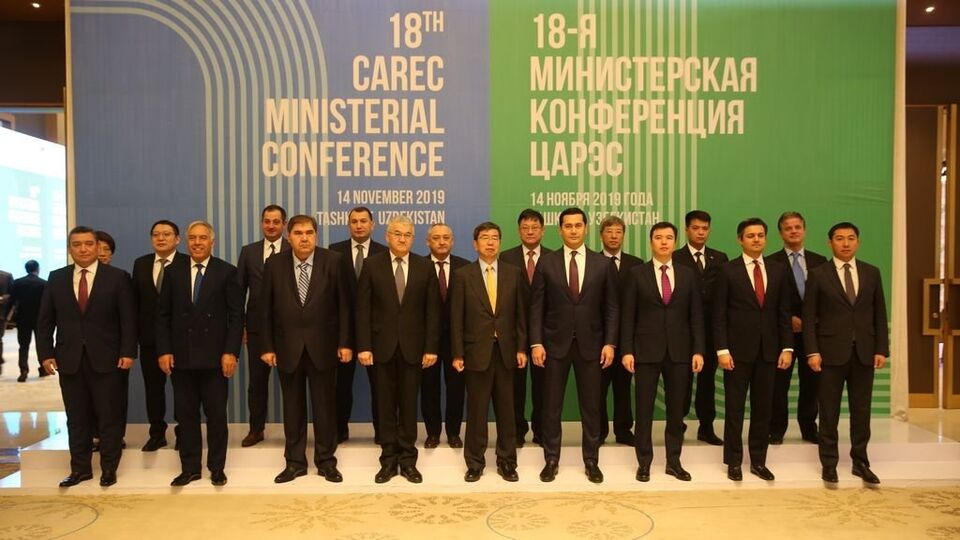On 14 November 2019, Tashkent was the venue of the 18th Ministerial Conference on Central Asian Regional Economic Cooperation titled "New CAREC: Expanding horizons of regional cooperation."
Attendees included the heads of economic, financial and energy agencies of countries involved in the CAREC programme, as well as representatives of international organisations, including the ADB, the ECO, the EBRD, the IMF, the IsDB, the UNDP, the ESCAP, USAID, the World Bank, and the WTO.
In his message of greetings to those taking part at the conference, President of the Republic of Uzbekistan Shavkat Mirziyoyev noted that, over a period of the past few years, the CAREC had evolved into an effective format for jointly addressing key regional development matters.
"Owing to its location, the region boasts a tremendous transit and transport potential and should occupy a befitting place in the global infrastructure and become a component part of transcontinental transport corridors," the message notes.
"The region's steady and sustainable development is inextricably linked with the modernisation of the energy infrastructure, the wide-scale use of alternative energy sources and the reinstatement of the common energy market, with due consideration for the implementation of multilateral energy projects.
An integrated trade programme, passed with CAREC support, stipulates simplified trade procedures and streamlined customs administration. The transport and energy development strategies until 2030 have been drafted, and all this creates favourable conditions for the region's development as an integral and promising market," the Uzbek President's message, read out by Presidential Advisor Ravshan Gulyamov, points out.
In his speech, Asian Development Bank President Takehiko Nakao noted the CAREC region's positive economic performance. For example, regional growth rates (minus China) accelerated from 4.6 percent in 2017 to 4.9 percent in 2018, and regional trade volumes increased by 13.1 percent.
He noted the Asian Development Bank's readiness to help implement the CAREC 2030 strategy in the field of transport, trade, tourism, agriculture and water resources and the development of human capital. Since its estabinception
in 2001, the CAREC has financed 200 regional transport, trade and energy projects worth $37 billion. Of this amount, the Asian Development Bank contributed $14 billion. Other development partners, including the World Bank, the Islamic Development Bank and the European Bank of Reconstruction and Development, contributed $14.8 billion, while the governments of CAREC countries provided $8.2 billion.
In his message, SCO Secretary-General Vladimir Norov noted that participants in the 18th SCO Heads of Government Council meeting had underscored the need to create an interlinked Eurasian infrastructure, digital and energy system in the interests of forging an open, mutually beneficial and equitable partnership and cooperation.
The message noted the need for the further expansion of multimodal transport and logistic centres, increasing traffic volumes involving all transport means, primarily road and railway transport, as well as the creation of a modern transport infrastructure.
The message also deals with the approval of an upgraded programme of long-term intra-SCO economic, cultural and humanitarian cooperation until 2035.
"SCO member states will have to focus on the expansion of the transport infrastructure, faster processes of harmonising and merging transport standards and simplifying trade rules in the near future. The SCO is open to mutually beneficial regional cooperation with all multilateral organisations, including CAREC, all the more so as most of the CAREC member countries are also SCO member states, observers or dialogue partners," the SCO Secretary-General's message, read out by Deputy SCO Secretary-General Aizada Subakozhoeva, notes.
The participants approved the new CAREC transport and energy strategy until 2030; this became the main result of the ministerial meeting.
The CAREC transport strategy until 2030 aims to boost trust between member countries and to eliminate the existing non-physical barriers by expanding all links of the multimodal transport infrastructure and using advanced international experience during the elaboration of regional and national transport policies.
In an effort to improve cross-border traffic and logistics, the strategy focuses on integrated transport systems using ground, high-seas and air routes, as well as IT and communications networks. The strategy will focus on railway transport's
greater commercial competitiveness, financial stability, environmental friendliness and safety. The document also offers measures to liberalise the regional aviation services market, by involving foreign airlines and low-cost carriers.
"CAREC now has a road map which advances into the future hinging on multilateral and bilateral cooperation. Future energy supplies will become reliable, affordable, more environmentally friendly and more stable, and this has vital significance for ensuring uninterrupted economic development," the Asian Development Bank's Vice President (Operations) Shixin Chen explained. The CAREC energy strategy will improve the energy market's integration through rational planning of electricity grids and the energy sector's projects portfolio. Sustained energy supplies will create opportunities for energy exports to reach lucrative energy markets in China, Pakistan and India, as well as new long-term strategic oil and gas transit opportunities via Turkey and Georgia.
The CAREC programme facilitates economic growth and development of member countries through regional cooperation and with the support of development partners. It involves 11 countries, including Afghanistan, Azerbaijan, the PRC, Georgia, Kazakhstan, Kyrgyzstan, Mongolia, Pakistan, Tajikistan, Turkmenistan and Uzbekistan. The CAREC secretariat is located at the Asian Development Bank's headquarters in Manila.
